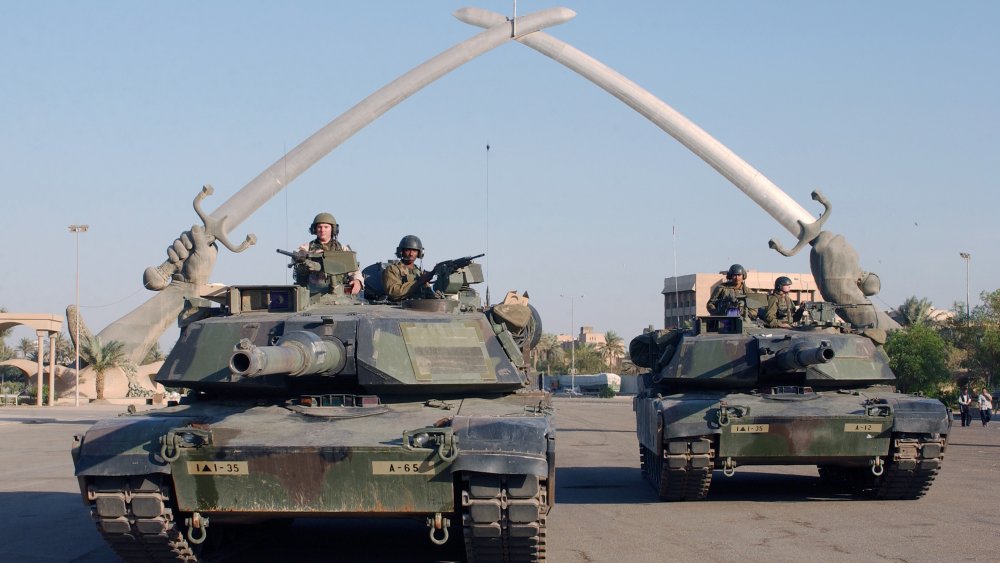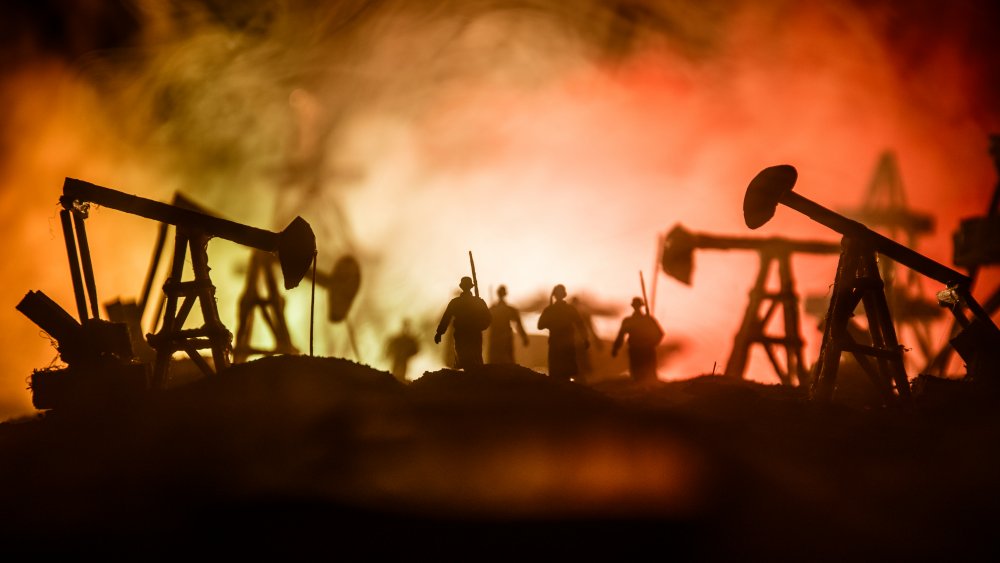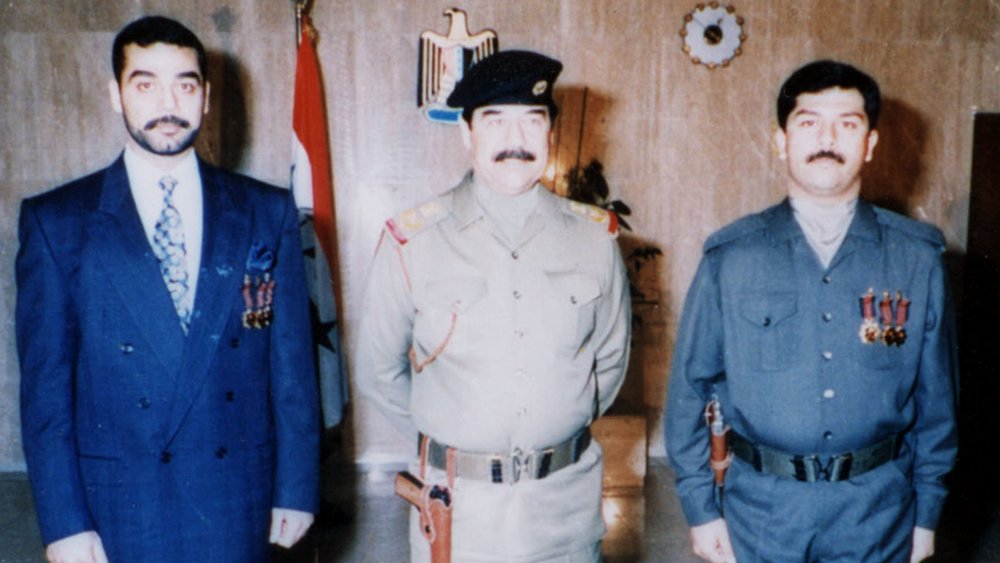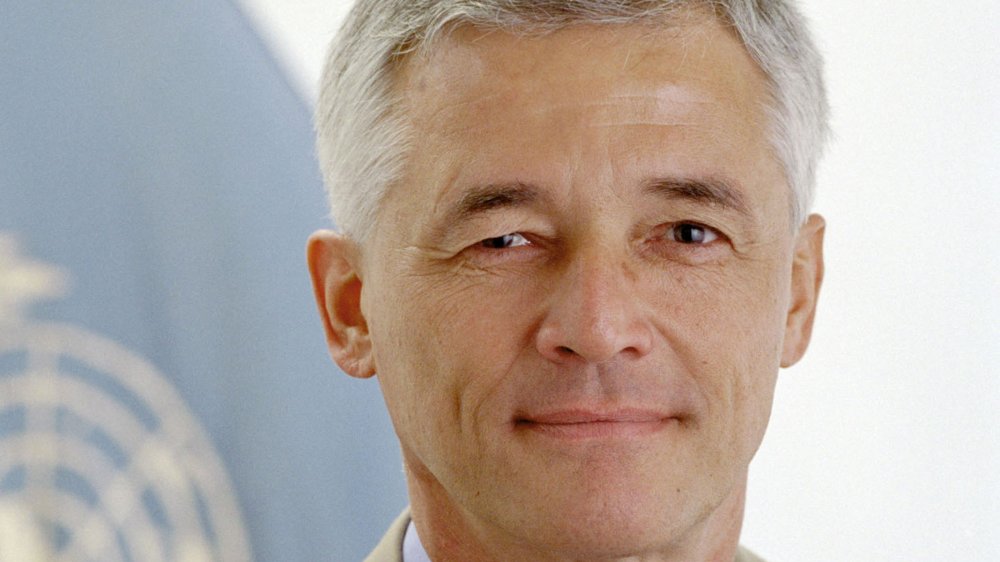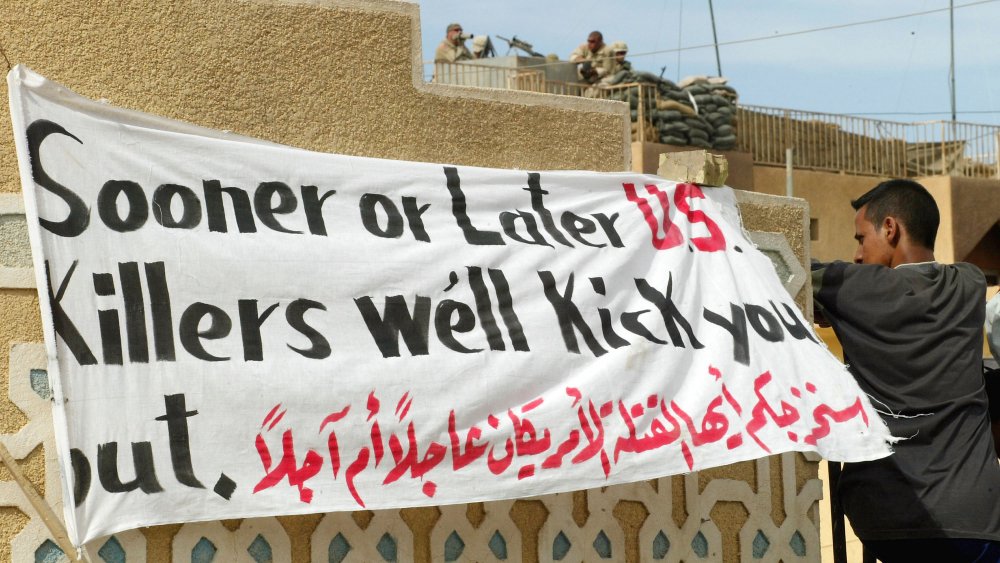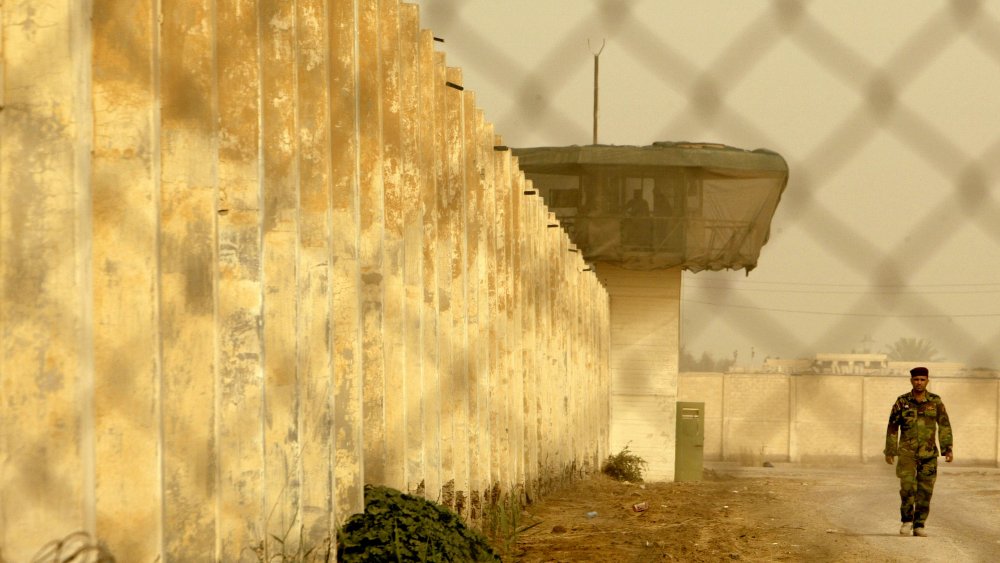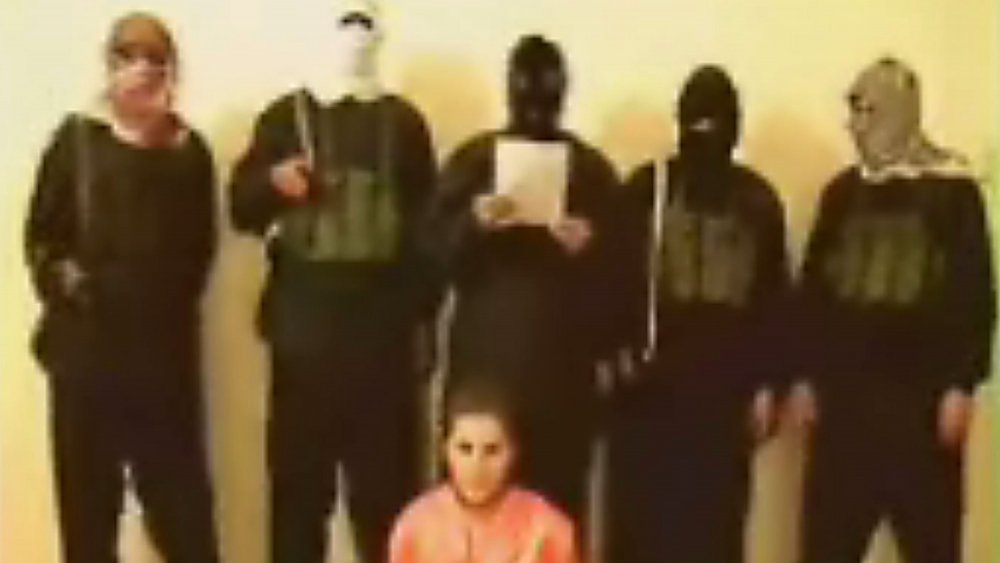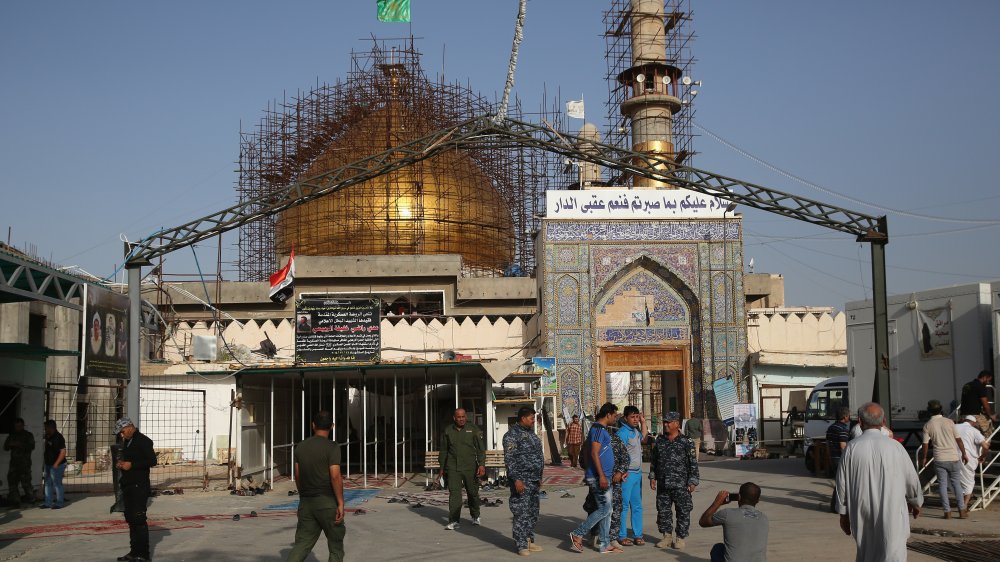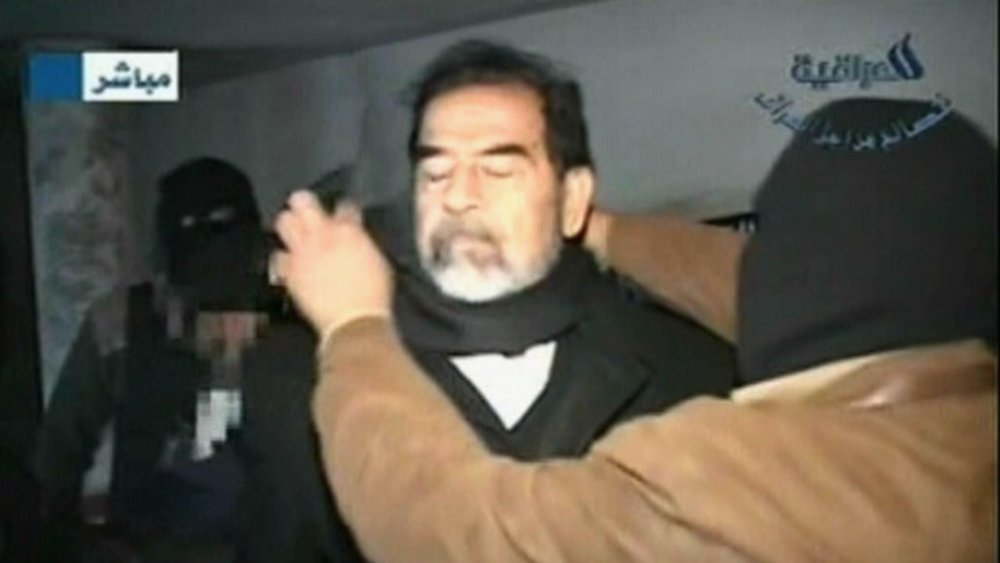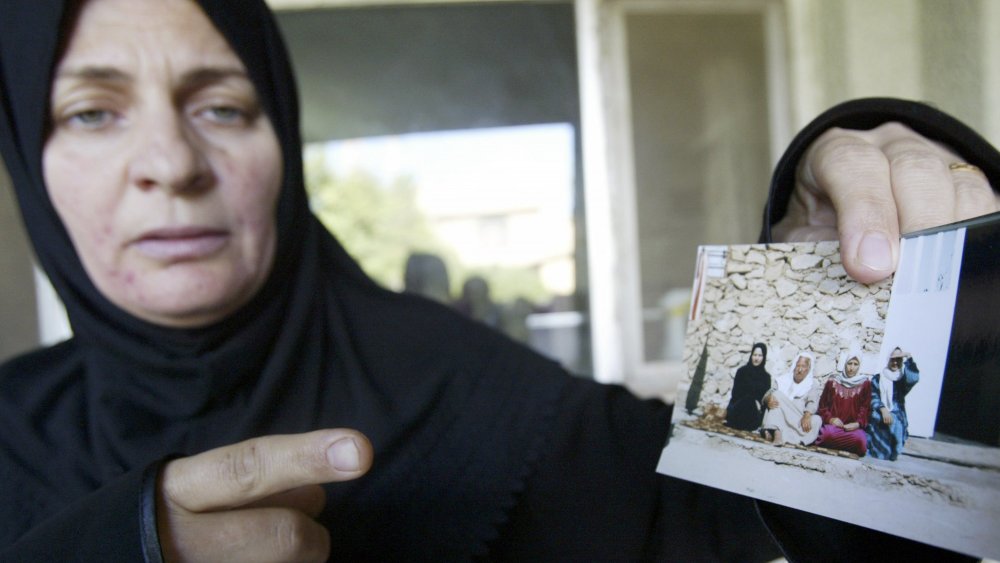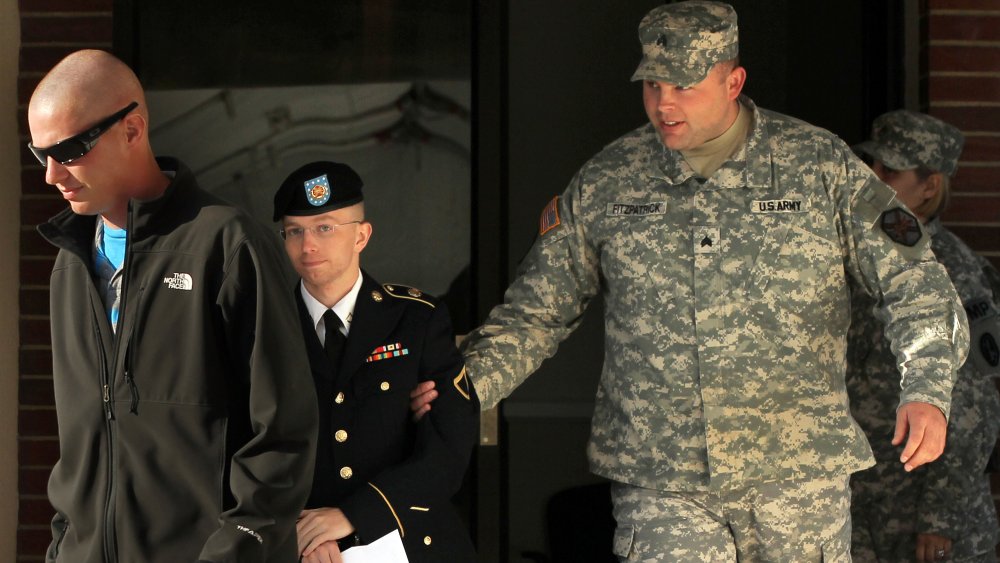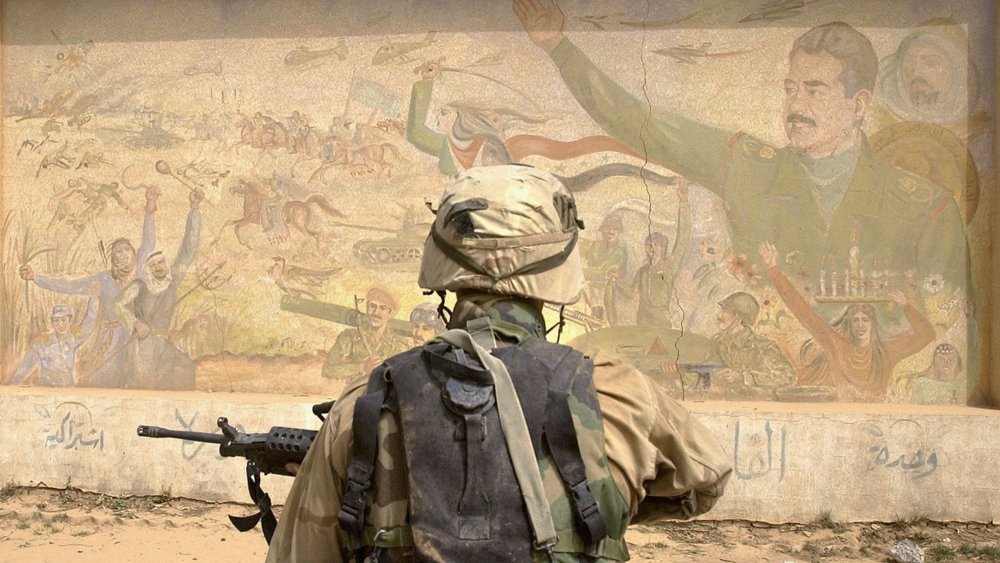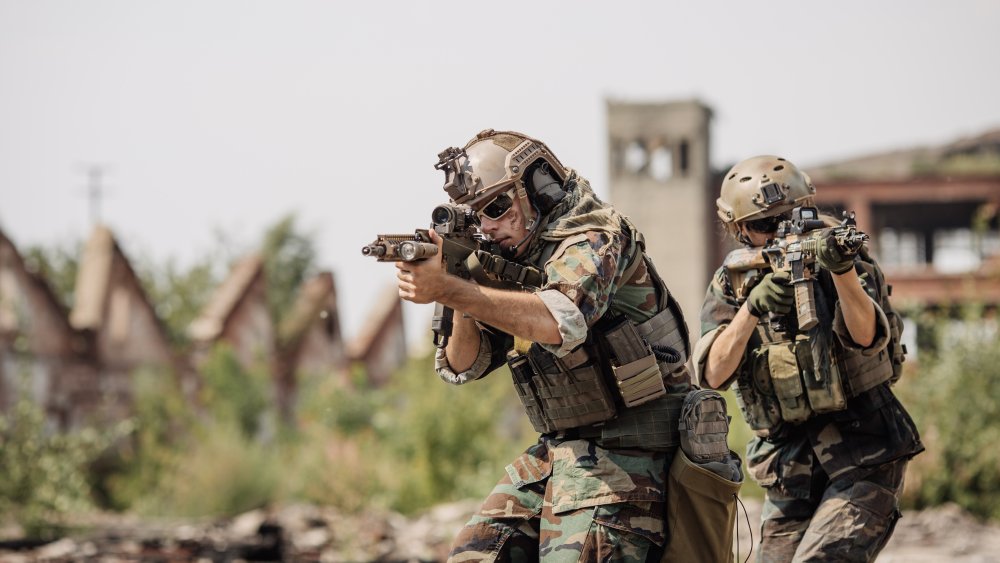Messed Up Things That Happened During The Iraq War
We may receive a commission on purchases made from links.
In March 2003, the US military, along with a 38-nation "coalition of the willing" (which shrank quickly as the years wore on), invaded the Republic of Iraq. From a quick and successful ground invasion (as had been entirely expected) to an interminable morass of a decade-long occupation, the Iraq War has helped shape a generation of US foreign policy.
Like all wars, what is sometimes called the Second Gulf War was filled with hell, heroes, and mistakes both harrying and hilarious. America's (mis)adventure in Iraq started out fubar, hit snafu after snafu after snafu, and, after a depressing and bloody ten years, ended completely SOL. We plucked just a few examples to bring you 12 of the most messed up things that happened during the Iraq War. Be warned, we toned down or tossed out the most graphic episodes, but war is war, and some stories may make you uncomfortable.
The Iraq War started controversially
Operation Iraqi Freedom, the Iraq War's official title, was the sequel nobody asked for — except obviously someone did because US forces spent the better part of a decade there (and some 5,000 US servicemembers still remain). The possible reasons why are as varied as they are contentious and are perhaps the most messed up thing about the entire conflict.
Operation Desert Storm, America's first — and successful — war with Iraq was a relatively straightforward affair: Iraq invaded neighboring Kuwait who, as UPI reported, asked the US for help. In 2003, though, President George W. Bush was concerned that Iraq posed a threat to America itself. As then-Secretary of State Condoleezza Rice told CNN in 2002, "We don't want the smoking gun to be a mushroom cloud." However, the weapons of mass destruction that US intelligence said Iraqi president Saddam Hussein had were never found.
A 2019, an Al-Jazeera opinion column argued that the war was, as they report then-Secretary of Defense Donald Rumsfeld saying, an opportunity to "enhance US credibility and influence throughout the region." The Guardian's John Chapman summed up probably the most common global opinion that the US invaded Iraq to get "control over oil and preservation of the dollar as the world's reserve currency." A more ancient motivation was also possible, suggested ABC News: revenge. As President Bush said about Hussein, "After all, this is a guy that tried to kill my dad."
US military releases pictures of Saddam's dead sons
Saddam Hussein was the duly elected president of the Republic of Iraq — duly elected in this instance meaning "repressive dictator responsible for horrific war and attempted genocide." Saddam's sons, Uday and Qusay, enjoyed the fruits of their father's success by going full Caligula.
Uday was made president of the Iraqi National Olympic Committee, where, as ESPN reported, he was accused of torturing athletes for losing games. He stuck them in prison for however long suited him, occasionally having them beaten, caned, or chained to the wall. They were "dragged on pavement until their backs are bloody, then dunked in sewage to ensure the wounds become infected." Qusay was heir to the throne and was believed to have been in charge of the military, and he is alleged to have orchestrated everything from assassinations to mass executions. When their father was overthrown and the Iraqi military defeated, Uday and Qusay tried to flee the country but, after being refused by Syria, were killed by coalition forces.
Two days after their death, to further prove to the Iraqi people that Saddam and his regime were truly finished, the US military released fairly graphic photos of their battered corpses, sparking an international debate. The BBC reported that even some Pentagon generals called it "repugnant." The UK's Iraq envoy explained to the BBC that, "The Iraqi people wanted absolute certainty that these people are dead."
UN envoy is killed
Sergio Vieira de Mello had a storied career at the United Nations before becoming that organization's special envoy to Iraq. He spoke seven languages, was well-liked by world leaders, spent decades in the world's most troubled locations, and was known as a bit of a playboy. The former US ambassador to the UN described him as "a cross between James Bond on the one hand and Bobby Kennedy" to NPR. His reputation was such that even cynic extraordinaire Christopher Hitchens glowed with praise for "the most devoted and humane of the world body's civil servants," and his life got made into Netflix movie in 2020.
In the 1980s, de Mello helped resettle tens of thousands of Vietnamese refugees. During the 1990s, he assisted the repatriation of over 300,000 Cambodian refugees and negotiated a cease-fire between the Bosnians and Serbs during the Siege of Sarajevo. From 1999 to 2002, he helped guide East Timor into independence after a decades-long military occupation by neighboring Indonesia.
Unfortunately, this last posting marked him for death by Al-Qaeda. Even though de Mello was an avid opponent of the American invasion and occupation, the fact that he presided over the withdrawal of the mostly Muslim Indonesian military from East Timor, and was now in Iraq working for the UN, led to an Al-Qaeda suicide bomb attack on UN headquarters in Baghdad in 2003 in which he and 21 other people were killed.
Four US military contractors are hung from a bridge
By March 2004, the invasion had been over for almost a year, and the planned rebuilding of Iraq had become derailed by bloody civil and guerrilla war. Organized resistance and a giant influx of foreign fighters, including Al-Qaeda, were forcing vicious street battles with coalition forces and detonating suicide bombs.
Fallujah was a city particularly brutalized by the escalating violence, and the surrounding area was the most dangerous in the country. At the end of March, 12 miles outside of the city, a roadside bomb exploded, killing five US soldiers. A few hours later, a convoy of American military contractors was ambushed inside Fallujah. Their vehicles were riddled with bullets, and the bodies of the four men inside were dragged out by cheering crowds, beaten, set alight, hacked at, and then dragged through the streets. Finally, two burned and battered bodies were hung from a bridge across the Euphrates River. One man stood nearby holding up a sign, according to the San Francisco Chronicle, with a skull and crossbones. "Fallujah is the cemetery for Americans," it read.
A week later, thousands of US Marines and Iraqi soldiers cordoned off and stormed the city. Fallujah would become a battle described by the Veterans of Foreign Wars as "the fiercest urban fighting for U.S. Marines and soldiers since Vietnam's Battle of Hue."
Torturing prisoners
Abu Ghraib is an Iraqi prison outside of Baghdad and was used by Saddam Hussein for decades to jail and torture tens of thousands of people. No photographs exist from that time period, but Amnesty International, as reported by the BBC, accused Saddam of using Abu Ghraib to round up and execute hundreds and thousands of political opponents, dissidents, and journalists. After the invasion, mass graves associated with the prison were found, and reports of cruelty were given to foreign journalists. As a local resident told Newsweek in 2003, "I saw three guards beat a man to death with sticks and cables." After the fall of Saddam, the prison was emptied and looted, stripped even of doors, windows, and bricks.
The US military took control of Abu Ghraib in April 2003. They refurbished the facility and began using it as a limited detention center, but its mandate quickly escalated, with military intelligence officers routinely interrogating prisoners. In the spring of 2004, it was revealed that the military staff and leadership of Abu Ghraib were being investigated for "sadistic, blatant, and wanton criminal abuses." The New Yorker broke the story with government documents providing lurid details of beatings, sodomizing, dog attacks, and ritual humiliation.
The US government was coming under increasing criticism for its failure to find the WMDs, and the Abu Ghraib scandal further undermined America's moral stance as an occupying force.
Videotaped beheading of an American
Iraq was a dangerous place for Americans in 2004. Suicide bombers, ambushes, and roadside bombs were part of an escalation of hostilities that targeted civilians as well as military personnel. The occupation was now over a year old, and in addition to dealing with sectarian violence and guerrilla resistance forces, US forces now had to contend with Al-Qaeda.
In early May, a video was posted online showing a man kneeling on the ground in front of multiple masked men. The kneeling man was Nick Berg, a 26-year-old American looking to help rebuild Iraq. He gave some details about himself to the camera before one of the masked men read a statement urging all Muslims to attack Americans in revenge for the recently revealed misconduct at Abu Ghraib. "Nation of Islam, is there any excuse left to sit idly by?" said the statement, according to The New York Times. Then the men pushed Nick to the floor and, shouting "God is great!," used a machete to slowly saw off his head. We cannot recommend enough that you do not google this video — no adjectives exist to adequately describe how disturbing it is.
The Al-Qaeda website where the video was posted, according to The Irish Times, claimed that Abu Musab al-Zarqawi, a senior figure in Al-Qaeda and ally of Osama bin Laden, was the man who decapitated Berg. Al-Zarqawi would go on to mastermind several more attacks.
The bombing of a mosque nearly starts civil war
Iraq is a Shiite Muslim-majority country but ruled, as described by Smithsonian Magazine, by a Sunni minority. Keeping the peace between the two groups would be a major objective for occupation forces after the overthrow of the Hussein regime — a mission widely seen as unsuccessful.
In 2006, three years into the occupation, Iraq was nearly a failed state, and sectarian violence was widespread as tensions between the Shiite and Sunni communities grew. The terrorist group Al-Qaeda was, and remains, a predominantly Sunni group, and they were responsible for the deaths of hundreds in Iraq, including a car bomb at the al-Askari mosque in Samarra that year. The shrine at al-Askari is an important one to Shia, drawing pilgrims from all over the world, and a wave of violence followed the bombing. The CBC reported that at least 18 people were killed and over 90 Sunni mosques attacked that week.
American officials at the time downplayed the severity of the problems. As Foreign Policy reported in 2010, while then-US commander General George Casey said in a television interview at the time that, "The country is not awash in sectarian violence,” troops in the streets were reporting bodies everywhere and were finding evidence that up to 1,000 people may have been killed in Sunni-Shiite violence just in the first week after the bombing.
Saddam's execution
Saddam Hussein ruled Iraq for 24 years. He was responsible for the disastrous death toll of the Iran-Iraq War and the unprovoked invasion of Kuwait and was accused of violently crushing political dissent and supporting overseas terrorism. For over ten years, the US, France, and Britain maintained a No-Fly Zone over large swaths of Iraq to protect the country's Kurdish minority from Saddam's chemical weapons attacks against them. Saddam was regularly censured by the United Nations, and it was common knowledge that, as left-leaning think tank Brookings Institution put it in 2002, he had "chemical weapons in abundance and probably biological agents as well." Ending Saddam's regime was, if not a direct reason for the war, regularly touted as a perk.
When his government fell, Saddam went into hiding, and statues and paintings of him were torn down all around the country. When US forces pulled him out of a "spider hole" dirty and unkempt, he looked nothing like the strongman image he'd spent decades building — he looked defeated. His trial was public, and so was his execution.
Iraqis were divided in their reactions to the news and images of Saddam's death. Speaking to CNN ten years later, one Iraqi said, "My family felt that Saddam Hussein was not punished enough for his crimes." Another said, "I started crying because [...] I felt they executed Iraq. I know that Saddam Hussein was a dictator [...] but he represented Iraq."
US forces kill 24 unarmed Iraqis
In November 2005, Staff Sergeant Frank Wuterich was leading his squad through the city of Haditha when their convoy was hit by a roadside bomb, killing one of his Marines. As reported by CBS, Sgt. Wuterich led his squad to a nearby cluster of houses in an enraged search for those responsible, instructing his men to "shoot first, ask questions later." What followed was the deaths of 24 unarmed Iraqi civilians, including ten women and children, in what was called the worst US military war crime since the infamous 1968 My Lai massacre in Vietnam.
Sgt. Wuterich was one of eight Marines charged with murder or manslaughter for what happened in Haditha. In court, he acknowledged the "shoot first" order but denied it was a massacre. "The truth is: I never fired my weapon at any women or children that day," he told the military judge at trial. Prosecutors argued that his order violated the rules of war as well as his training as a Marine. "That is a horrific result from that derelict order of shooting first, ask questions later," Lieutenant Colonel Sean Sullivan told the court.
After more than six years, Sgt. Wuterich was found guilty in 2012 — the only one of the eight to be convicted. He got the maximum sentence of three months' confinement, a reduction in rank, and forfeiture of two-thirds of his pay. He received no jail time.
US forces kill two Reuters staff
On July 12, 2007, two US military Apache helicopters were dispatched to a Baghdad neighborhood after reports of gunfire in the area. They found a group of men, some armed, and the Apaches engaged them, killing a dozen people, including two Reuters news staff.
Three years later, according to Al-Jazeera, "a Sweden-based organisation that publishes anonymous submissions and leaks of sensitive documents from governments and other organisations" that nobody had ever heard of, named Wikileaks, released a video online purporting to show the events of the Apache airstrike. Published under the title "Collateral Murder," the video revealed details many found shocking. The candid banter of the Apache personnel included impatient pleading to be allowed to fire. "Come on, let us shoot," said one unidentified voice in the recording. When US ground forces began evacuating the wounded, a different voice said, regarding two children injured in the attack, "Well, it's their fault for bringing their kids into a battle."
The US military said an investigation was conducted immediately after the incident and determined that American forces, unaware of the presence of news staffers, behaved correctly. Reuters demanded that the American government conduct a full and objective investigation into the killing of the two staff. Other than arresting a military whistleblower for leaking the video to Wikileaks, no charges were ever filed in connection with the incident.
Baghdad Bob
Mohammed Saeed al-Sahhaf's cushy job as Iraqi information minister for Saddam Hussein got a lot harder in early 2003. As chief propagandist for an administration used to getting 100 percent of the votes, al-Sahhaf was a practiced spin doctor — Saddam's government and family never lacked for atrocities, lies, crimes, and embarrassments to obfuscate and cover up. However, when the US-led coalition invaded in March, maintaining the pretense of Saddam's power became simultaneously all-important and impossible.
But al-Sahhaf did it with such aplomb that he became an unintentionally hilarious star, especially online. He told such astonishingly bald-faced lies, with such exuberance, that The Seattle Times reported that even President Bush was a fan. Whenever al-Sahhaf gave a press conference, Bush said that, "I'd pop out of a meeting or turn and watch the TV." Once, as Iraqi troops were literally running for cover behind him, CNN reports, "Baghdad Bob" told foreign journalists that under the glorious leadership of Allah's favorite son, "The infidels are committing suicide by the hundreds on the gates of Baghdad."
After the war, or at least his part in it, al-Sahhaf was hired as a TV pundit by Abu Dhabi TV and today lives quietly in the United Arab Emirates. A documentary, Comical Ali, has compiled the best of al-Sahhaf's TV appearances, and a website dedicated to al-Sahhaf's most memorable quotes is still active.
The high cost and war crimes
According to the Council on Foreign Relations, over one million US airmen, soldiers, sailors, and Marines have served in Iraq since 2003. Business Insider reported that the Iraq War cost US taxpayers over $2 trillion, an average of $8,000 each. With that much money going to, and that many servicemembers operating in, Iraq, it is a statistical certainty that some episodes of the types described above would happen. But the US government has spent almost every year since the invasion defending against many more accusations.
For one, it's impossible to even count how many Iraqis were killed in the invasion and subsequent occupation. In 2013, the BBC reported the results of a university study with researchers from the US, Iraq, and Canada that concluded almost half a million Iraqis died. Peace activists published research suggesting that it could be as high as 2.4 million dead Iraqis — the US and UK governments dispute that figure.
In response to 240 individual reports, the International Criminal Court actually considered possible criminal charges against the British government regarding their forces in Iraq. The charges were dismissed because "the situation did not appear to meet the required threshold of the Statute" and prosecutors could not prove the "willful killing or inhuman treatment of civilians." As the United States is not a signatory to the ICC, no charges could be brought against any Americans.
